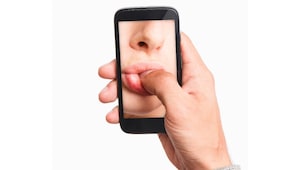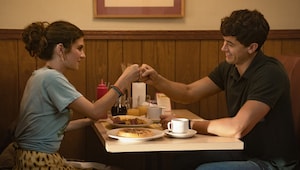Here's why saving numbers feels like a commitment—and what it says about the current dating culture
Does our inclination to always pick social media handles over digits reveal a deeper fear of commitment?

picture this: You’re out with your friends at a new bar, vibing in your best outfit, and all of a sudden, an attractive guy catches your eye. He makes his way over, introduces himself, and pops the question—not that one, obviously. He wants to know one of two things: your number or your Instagram handle? Spoiler: it’s almost always the handle.
Gone are the days of scribbling digits on napkins like we’re in a 2000s rom-com. Today, the dating game plays out in DMs, not texts—and that shift might be saying more about us than we realise. Could our preference for following over phoning be a lowkey sign of modern-day commitment phobia?
Asking for someone’s number is a bold move—one that demands follow-through. It’s no longer just a casual exchange; it implies the intention to initiate, maintain, and potentially escalate communication. There’s an unspoken social contract: if I take your number, I need to text, call, or plan something. It signals romantic interest and, more importantly, intention, which can come off as overly eager in a culture obsessed with playing it cool.
The alternative? Social media. Just because you’re on my follower list doesn’t mean I want to take you out. In fact, with most twenty-somethings racking up over 500 followers, access to someone's online life feels more like a mass invitation than a personal gesture. You're lumped in with coworkers, high school classmates, and your cousin's best friend’s dog. It’s deliberately ambiguous—and that’s the point. When two people follow each other, there’s no clear etiquette about who should make the first move. And if one of you does, there’s a handy buffet of conversation starters already available—photos, captions, even shared Spotify playlists.
Blame it on the apps—our brains are now wired for instant gratification. With an endless scroll of potential matches just a swipe away, the idea of fully committing to one person can feel...outdated. There’s even a theory for this. According to Rusbult’s Investment Model of Commitment (1980), commitment depends on three things: how into someone you are, what you’ve already invested (mutual friends, shared playlists, inside jokes), and whether or not you think you could do better. Thanks to dating apps, the third one is a major factor.
When the “maybe better” is just another swipe away, why would anyone stick around for the awkwardness of a real connection? And even if they did, the promise of countless potential alternatives can be more tempting a reward for some, which more often than not, lead to infidelity. And well, if being in a committed relationship doesn’t stop people from scanning the horizon for alternatives, it’s no wonder that asking for a phone number, and all that it implies, feels like jumping ahead of the social script.
Then there’s the anxiety of actually making a phone call. Swiping on a dating app feels anonymous. Messaging is asynchronous—you can respond whenever you want, after crafting the perfect reply. It’s gotten to the point where, even after being in the “talking stage,” exchanging numbers can feel like an entirely new milestone. And that points to another modern dating woe—telephobia.
Yes, it’s a real thing. Telephobia, a form of social anxiety, causes people to feel discomfort or panic when anticipating or making phone calls. It stems from our reliance on asynchronous communication, which doesn’t require immediate responses. Gen Z grew up with text, email, and DMs—not spontaneous, real-time calls. The pandemic only reinforced that. Calls now feel invasive and unpredictable—emotional minefields filled with the risk of awkward pauses, misread tones, or saying something you instantly regret.
This digital distance also makes it easier to avoid confrontation. Why go through a messy breakup over the phone when you can just...ghost someone on Instagram? Blocking a number carries more emotional weight than simply muting a profile. And when you control the timing and tone of every message, you also control the narrative.
Let’s be real. We’re all guilty of giving into this new communication culture—but that doesn’t mean it’s not terrifying. We now live in a world where everything we share is curated, and every interaction is strategic. Every move, down to how we exchange contact details, has implications. Because the medium, as they say, is the message. It reflects how much we’re willing to invest, and how quickly.
So maybe the real question isn’t how eager is too eager—but what does eagerness even look like in a dating world shaped by algorithms, infinite options, and a whole lot of avoidance?
Lead image credit: Netflix
Also read: The truth about dating red flags you’re secretly ignoring
more from Relationships

Can “friendfluence” save dating?

Stop posting about your shitty boyfriend (unless you’re gonna dump him)

15 BDSM movies that aren’t just ‘Fifty Shades of Grey’

15 FaceTime sex positions to level up your virtual connection

The four everyday habits quietly damaging your relationship—and expert tips on how to break them

Dating with deadline—inside the 'sunset clause' dating trend

From courts to catwalks—the wild backstories of the world’s most iconic sneakers

“All eyes on the midriff” should have been the only instruction given at the 2026 Grammy’s

Sip, flirt, repeat: Inside New Delhi’s most discreetly delicious cocktail bar

Is 'Bridgerton' season 4 saving its juiciest drama for Part 2?
